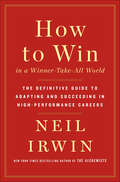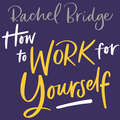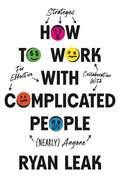- Table View
- List View
How to Win Friends and Influence People in the Digital Age (Dale Carnegie Books)
by Dale Carnegie AssociatesAN UP-TO-THE -MINUTE ADAPTATI ON OF DALE CARNEGIE 'S TI MELE SS PRESCRIPTI ONS FOR THE DIGITAL AGE DALE CARNEGIE's commonsense approach to communicating has endured for a century, touching millions and millions of readers. The only diploma that hangs in Warren Buffett's office is his certificate from Dale Carnegie Training. Lee Iacocca credits Carnegie for giving him the courage to speak in public. Dilbert creator Scott Adams called Carnegie's teachings "life-changing." In today's world, where more and more of our communication takes place across wires and screens, Carnegie's lessons have not only lasted but become all the more critical. Though he never could have predicted technology's trajectory, Carnegie proves a wise and helpful teacher in this digital landscape. To demonstrate the many ways his lessons remain relevant, Dale Carnegie & Associates, Inc., has reimagined his prescriptions and his advice for this difficult digital age. We may communicate today with different tools and with greater speed, but Carnegie's advice on how to communicate, lead, and work efficiently remains priceless across the ages.
How to Win Friends and Influence People: Updated For the Next Generation of Leaders (Deluxe Hardbound Edition Ser.)
by Dale CarnegieUpdated for the first time in more than forty years, Dale Carnegie&’s timeless bestseller How to Win Friends and Influence People—a classic that has improved and transformed the personal and professional lives of millions.This new edition of the most influential self-help book of the last century has been updated under the care of Dale&’s daughter, Donna, introducing changes that keep the book fresh for today&’s readers, with priceless material restored from the original 1936 text. One of the best-known motivational guides in history, Dale Carnegie&’s groundbreaking publication has sold tens of millions of copies, been translated into almost every known written language, and has helped countless people succeed. Carnegie&’s rock-solid, experience-tested advice has remained relevant for generations because he addresses timeless questions about the art of getting along with people. How to Win Friends and Influence People teaches you: -How to communicate effectively -How to make people like you -How to increase your ability to get things done -How to get others to see your side -How to become a more effective leader -How to successfully navigate almost any social situation -And so much more! How to Win Friends and Influence People is a historic bestseller for one simple reason: Its crucial life lessons, conveyed through engaging storytelling, have shown readers how to become who they wish to be. With the newly updated version of this classic, that&’s as true now as ever.
How to Win Grants: 101 Winning Strategies
by Alan SilverConcisely written and easy to follow, How to Win Grants demonstrates a three-stage grant development model distilled into 101 actionable strategies, arranged in order of execution and supplemented by helpful checklists. In stage one, "Prepare," grantseekers begin by assessing their personal and agency fundability, improving their positioning for grants, learning shortcuts to planning successful grant projects, and finding out how to locate the most likely sources of grant funding. In stage two, "Persuade," grantseekers learn how to convince private and public grantmakers that their project deserves funding by adapting their project plan to the specific needs of each funder. In stage three, "Perform," readers learn the most important ways to continue attracting grant funding for the long term. This indispensable guide also dispels widespread myths about grantseeking, identifies unproductive behaviors to avoid, and teaches readers how to engage the funder's interest and make the most compelling case for their project. With all this and more, How to Win Grants is every individual and organization's ticket to a winning grantseeking campaign!
How to Win Your Personal Injury Claim
by Joseph MatthewsAfter your injury: Settle your claim the right way When you've been hurt in an accident, dealing with insurance companies and lawyers can feel exhausting. But armed with the right information, you can handle a claim yourself--and save many thousands of dollars in the process. How to Win Your Personal Injury Claim shows you how to handle almost any accident situation and guides you through the insurance claim process, step by step. Learn how to: protect your rights after an accident determine what your claim is worth deal with uncooperative doctors and insurance companies counter the special tactics insurance companies use prepare a claim for compensation negotiate a full and fair settlement stay on top of your case if you hire a lawyer This completely updated edition of How to Win Your Personal Injury Claim provides your state's most recent laws, including small claims court limits and lawsuit filing deadlines. a new chart explaining your state's in-car text and cell phone laws.
How to Win Your Personal Injury Claim
by Joseph MatthewsAfter your injury: Settle your claim the right way When you’ve been hurt in an accident, dealing with insurance companies and lawyers can feel exhausting. But armed with the right information, you can handle a claim yourself—and save many thousands of dollars in the process. How to Win Your Personal Injury Claim shows you how to handle almost any accident situation and guides you through the insurance claim process, step by step. Learn how to: protect your rights after an accident determine what your claim is worth deal with uncooperative doctors and insurance companies counter the special tactics insurance companies use prepare a claim for compensation negotiate a full and fair settlement stay on top of your case if you hire a lawyer This completely updated edition of How to Win Your Personal Injury Claim provides the latest state laws on small claims limits, no-fault car insurance, distracted driving, and lawsuit-filing deadlines.
How to Win Your Personal Injury Claim (6th edition)
The attorney author provides tips on both claims that consumers can handle themselves and those requiring working with a lawyer. Matthews discusses how fault is legally determined and covers all phases of the claim process. Helpful features include insurance contact information by state, sample documentation, and an accident claim worksheet. Annotation ©2004 Book News, Inc., Portland, OR (booknews.com)
How to Win at CRM: Strategy, Implementation, Management
by Seth KinnettThis book provides clarity and guidance on effective strategy, implementation and management of CRM. It explores both the conceptual and cultural context of CRM initiatives along with the particulars of CRM system implementation and management. In order to provide this clarity, it surveyed the existing academic publications surrounding CRM, sales force automation, and related topics within information systems literature. The book supplements this research with insights from CRM experts to provide a robust picture of the CRM landscape and how to improve it no matter what role you play within your organization. This book is for everyone who wants to achieve CRM success.
How to Win at Shopping: 297 Insider Secrets for Getting the Style You Want at the Price You Want to Pay
by Eila Mell David ZylaA book worth its weight in gold—or what one charges on a gold card. Written by two fashion experts with deep experience in fashion shopping and styling, How to Win at Shopping is perfect for the woman who loves to shop—there is priceless information on every page. And perfect for the woman who hates to shop—here’s the game plan to make it work. And for both, hundreds of ways to save money, time, and aggravation. Page after page is filled with knowledgeable insider tips, the hows and whys of shopping smart: Always beware of prices in carpeted areas of a store. Three-quarter sleeves are always flattering. Sometimes, for certain items like T-shirts or knits, it makes sense to shop in the boys’ department. For shoes, the best toe shape will always match your best neckline. Never shop in a hurry. When approaching a rack of clothing, always start with color. Always sit down when trying on clothing. There are style basics, like how to find the perfect pair of jeans. Money-saving tips, like why never to open a store credit card. Shopping rules, like leave your jewelry at home when shopping. Plus tips for shopping online, in thrift stores, and around the holidays. And throughout, separate lists, like the 15 secrets of finding clothes that make you look ten pounds thinner; the seven things a tailor can do—and six things a tailor can’t; and the top ten wardrobe staples.
How to Win at Travel
by Brian KellyTurn your wanderlust into reality with expert strategies from Brian Kelly, the founder of The Points Guy—the leading voice in travel and loyalty programs—with this ultimate resource for everything from leveraging airline and credit card points to planning your dream itinerary.In How to Win at Travel, Brian Kelly shares his greatest tips and strategies to experience the world in ways you never thought possible. This comprehensive guide is a road map with all of the knowledge and tools you need to become an expert traveler. Get practical advice on a range of topics, including how to find the cheapest flights; effectively leverage airline, hotel, and credit card loyalty programs; conquer your fear of flying; beat jet lag; and score free flights and upgrades. Kelly also covers the ins and outs of travel insurance and getting the right credit cards to make your travel more affordable and enjoyable. He discusses the art of dealing with travel mishaps, speaks to the technology you need to manage modern travel, and shares ideas for pinpointing the best destination for you. Whether you&’re a young adult traveling solo, a road warrior business traveler, a growing family looking for new experiences, or a retiree ready to explore the world, reach for this guide to plan an unforgettable trip. Easy to read, informative, and inspirational, How to Win at Travel is the definitive travel guide for your next adventure, no matter how big or small.
How to Win at the Sport of Business
by Mark CubanMark Cuban shares his wealth of experience and business savvy in his first published book, HOW TO WIN AT THE SPORT OF BUSINESS. "It's New Year's resolution time, and Mark Cuban's new book offers the rationale for a good one." —BUSINESS INSIDER Using the greatest material from his popular Blog Maverick, Cuban has collected and updated his postings on business and life to provide a catalog of insider knowledge on what it takes to become a thriving entrepreneur. He tells his own rags-to-riches story of how he went from selling powdered milk and sleeping on friends' couches to owning his own company and becoming a multi-billion dollar success story. His unconventional yet highly effective ideas on how to build a successful business offer entrepreneurs at any stage of their careers a huge edge over their competitors. "In short, [HOW TO WIN AT THE SPORT OF BUSINESS] exceeded...expectations. Short chapters...got right to the point and were not filled with 'stuffing'." —HUFFINGTON POST
How to Win in a Winner-Take-All World: The Definitive Guide to Adapting and Succeeding in High-Performance Careers
by Neil IrwinFrom New York Times bestselling author and senior economic correspondent at The New York Times, how to survive—and thrive—in this increasingly challenging economy.Every ambitious professional is trying to navigate a perilous global economy to do work that is lucrative and satisfying, but some find success while others struggle to get by. In an era of remarkable economic change, how should you navigate your career to increase your chances of landing not only on your feet, but ahead of those around you? In How to Win in a Winner-Take-All World, Neil Irwin, senior economic correspondent at the New York Times, delivers the essential guide to being successful in today’s economy when the very notion of the “job” is shifting and the corporate landscape has become dominated by global firms. He shows that the route to success lies in cultivating the ability to bring multiple specialties together—to become a “glue person” who can ensure people with radically different technical skills work together effectively—and how a winding career path makes you better prepared for today's fast-changing world. Through original data, close analysis, and case studies, Irwin deftly explains the 21st century economic landscape and its implications for ambitious people seeking a lifetime of professional success. Using insights from global giants like Microsoft, Walmart, and Goldman Sachs, and from smaller lesser known organizations like those that make cutting-edge digital effects in Planet of the Apes movies or Jim Beam bourbon, How to Win in a Winner-Take-All World illuminates what it really takes to be on top in this world of technological complexity and global competition.
How to Win the Premier League: The Sunday Times Bestselling Inside Story of Football's Data Revolution
by Ian GrahamTHE SUNDAY TIMES BESTSELLER'The best book on football I have ever read' Daniel Finkelstein'Fascinating and educational. An enjoyable and informative read' Sir Kenny Dalglish'Deserves a place among the great modern books on football' Sam Wallace, chief football writer, Telegraph______________________________The insider account of the data revolution that has swept through the modern football world written by one of its key architects, Ian Graham.Between 2012 and 2023, Ian Graham worked as Liverpool FC's Director of Research. His tenure coincided with the club’s greatest period of success since the 1980s, including winning the Premier League in 2020 – Liverpool’s first league title after an agonising three decades.Here for the first time, Graham reveals the fascinating data that informed some of the club’s most pivotal moments of the past decade, from the appointment of Jurgen Klopp as manager in 2015 to the signing of Mohamed Salah in 2017. Along the way, he shares groundbreaking insight into the modern game, including how a season largely played behind closed doors transformed our understanding of home team advantage, or why the GOAT (greatest of all time) might not be who you think. And, in a game that is increasingly dominated by an elite few, Graham charts a path for the future where a data-savvy competitor will always find the edge.______________________________'A fascinating, witty and remarkably insightful account of Liverpool's reinvention and a clear-eyed, detailed explanation of the inner workings of modern football. Nobody is better qualified to tell either of those stories than Ian Graham, who stands as one of the most (quietly) significant figures in the recent history of the club and the sport' Rory Smith, author of Expected Goals and Chief Soccer Correspondent, New York Times'Never before has the data revolution in football been described so well from the inside.' Christoph Biermann, author of Football Hackers‘How to Win the Premier League gives you three books for the price of one: a book about all of the silly inefficiencies plaguing European football, a book about what it's like to be empowered to use outside-the-box thinking to help turn your boyhood club into the best team in the world, and a book about how football actually works. If he really wanted to, Ian could easily put me out of a job.’Ryan O’Hanlon, author of Net Gains and staff writer ESPN*A Sunday Times bestseller August 2024
How to Win: 36 Ancient Strategies for Success
by Eva WongPotent advice on how to think and act strategically in business, politics, and relationships--drawn from classic Chinese military and political expertise.The ancient strategies of war and politics have much to offer us in navigating the complicated challenges we face today--and to help us wisely and effectively meet our business, political, and relational goals. Here, eminent Chinese scholar and Taoist teacher Eva Wong unpacks the wisdom of The Thirty-Six Strategies, a collection of advice encoded in sayings, steeped in Chinese history and culture. She explores strategies attributed to renowned military philosophers such as Sun Tzu and Zhuge Liang (aka "The Sleeping Dragon"), along with other less-known advisors, that were implemented during three of the most chaotic eras of Chinese history--the Spring and Autumn Period, the Warring States Period, and the Three Kingdoms. Covering three categories of strategy--proactive, reactive, and desperate--Wong expertly connects the words of ancient military philosophers with timeless advice, as useful today as it was in the Tang dynasty (618-906) when this collection was originally gathered. In Chinese military philosophy and political theory, the thirty-six strategies are considered "yin" or "shadow" in nature, meaning that they operate best in darkness and concealment. As Wong writes, "Desperate times call for desperate measures, and since the thirty-six strategies rose out of times of war and conflict, it is inevitable that they were used to win wars, triumph over opponents, take advantage of situations, and survive when defeat is imminent."
How to Win: Rugby And Leadership From Twickenham To Tokyo
by Clive WoodwardIn his entertaining and informative new book, Sir Clive Woodward analyses the events of the 2019 Rugby World Cup, offering his unique perspective on the performance of players and coaches, from Owen Farrell and Kieran Read, to Eddie Jones and Steve Hansen.HOW TO WIN:Rugby and Leadership from Twickenham to Tokyo is much more than the story of a tournament, however. It is the distillation of a philosophy of leadership developed during a lifetime in high-performance environments, from the rugby field to the boardroom. Tapping into his experience of winning the 2003 World Cup, being a part of the leadership team that delivered Olympic Success in 2012 and lessons drawn from Japan 2019, the author delivers a go-to manual in how to improve both individual and team performance in order to reach the pinnacle in sport and in business.Every individual position in rugby requires a unique set of skills, knowledge and expertise that collectively form a balanced team; the same is true in any successful business or organisation. From 1 to 15, the former England and British and Irish Lions coach identifies the key attributes and uses these defining traits to explain his collaborative 'Teamship' leadership style.With a fascinating blend of analysis, insight and anecdote, and the highs and lows of a memorable Rugby World Cup as the setting, Clive reveals how to lead the culture of a winning team - in any context.
How to Win: Rugby and Leadership from Twickenham to Tokyo
by Clive WoodwardIn his entertaining and informative new book, Sir Clive Woodward analyses the events of the 2019 Rugby World Cup, offering his unique perspective on the performance of players and coaches, from Owen Farrell and Kieran Read, to Eddie Jones and Steve Hansen.HOW TO WIN: Talent Alone is Not Enough is much more than the story of a tournament, however. It is the distillation of a philosophy of leadership developed during a lifetime in high-performance environments, from the rugby field to the boardroom. Tapping into his experience of winning the 2003 World Cup, being a part of the leadership team that delivered Olympic Success in 2012 and lessons drawn from Japan 2019, the author delivers a go-to manual in how to improve both individual and team performance in order to reach the pinnacle in sport and in business.Every individual position in rugby requires a unique set of skills, knowledge and expertise that collectively form a balanced team; the same is true in any successful business or organisation. From 1 to 15, the former England and British and Irish Lions coach identifies the key attributes and uses these defining traits to explain his collaborative 'Teamship' leadership style.With a fascinating blend of analysis, insight and anecdote, and the highs and lows of a memorable Rugby World Cup as the setting, Clive reveals how to lead the culture of a winning team - in any context.(P) 2019 Hodder & Stoughton Ltd
How to Work Remotely: Work Effectively, No Matter Where You Are (Creating Success #13)
by Gemma DaleNon-office based work is here to stay, but everyone experiences it differently. Find out how to make working at home and remote work, work for you. How to Work Remotely will help anyone adapt to home, remote and hybrid working. Suitable for homeworkers, or the managers and leaders of homeworkers, this highly practical book will address how to be successful and build a career while working remotely, or away from the office. Packed with practical exercises and top tips, the book includes advice on wellbeing when working from home, how to get organized, how to start a new role when you're not in the office and suggestions on the best ways to be productive. HR specialist Gemma Dale also explains about managing the performance of remote and hybrid teams and effectively making home working accessible for all colleagues.The Creating Success series of books...Unlock vital skills, power up your performance and get ahead with the bestselling Creating Success series. Written by experts for new and aspiring managers and leaders, this million-selling collection of accessible and empowering guides will get you up to speed in no time. Packed with clever thinking, smart advice and the kind of winning techniques that really get results, you'll make fast progress, quickly reach your goals and create lasting success in your career.
How to Work With and Lead People Not Like You: Practical Solutions for Today's Diverse Workplace
by Kelly McdonaldIf you're in a diverse team, you know employee differences can cause miscommunication, lower trust, and hurt productivity. . . It doesn't have to be this way! The people you work with may be from a different generation, different culture, different race, different gender, or just a different philosophy toward work and life in general, but you need to work together toward a common goal. How to Work With and Lead People Not Like You explains how to dial down the differences, smooth out the friction, and play upon each other's strengths to become more effective, more productive, and less stressed. The keys are to find the common ground and identify hidden conflicts that are hurting productivity. Many people shudder at the prospect of working with diverse groups of people, but they can't voice their fear or anxiety. At work, it's not OK or politically correct to say, 'I'm uncomfortable with this person.' In fact, if you do say something along those lines, your job may be at risk. Your company may terminate you for not being on the 'diversity bandwagon.' So you keep quiet and you keep your thoughts to yourself. But deep down, you are uncomfortable. If you feel like this, it doesn't mean you're racist, sexist, ageist, homophobic, or any other negative label. It means you're struggling. You're struggling to understand people, cultures, or values that are unfamiliar to you. You're struggling to do your job with teammates and coworkers who may have very different viewpoints or different approaches to communication than you have. You're struggling to overcome differences and pull together to achieve high performance at work. Whether you're leading a diverse team, working in a challenging cross-cultural environment, or simply working with people who are 'not like you,' you need to be able to get along with everyone as a team, to get the work done. This book explains the skills you need to communicate, motivate, and inspire people to collaborate—even if they have very different values, lifestyles, or priorities. Learn key steps that bring cohesion to diversity How to have a constructive conversation about working alongside people who are different The four magic words that make this easier and smooth over friction What not to say—and why Learn to set aside differences and get things done Learn how to handle a racist, sexist, homophobic or offensive remark in a professional way Retain your sanity when colleagues drive you crazy The changing demographics of today's workforce bring conflicting viewpoints, perspectives, approaches, skills, habits, and personalities together in one place; whether that leads to synergy or catastrophe is up to you. How to Work With and Lead People Not Like You helps you turn a hurdle into an advantage so you or your team can do more, achieve more, and enjoy the ride.
How to Work Without Losing Your Mind
by Cate Sevilla'Genuinely empowering' Daisy Buchanan'An invaluable guide to surviving professional life' Viv Groskop'Comforting during these uncertain times' Yomi AdegokeAward-winning journalist and editor-in-chief Cate Sevilla has survived the messy, stressy and sometimes bizarre world of work - just.In How to Work Without Losing Your Mind, she gives an unflinchingly honest account of the bad bosses, the time spent crying in work loos, the hell and humiliation of her working life but, most importantly, she reveals the solid self-belief, the sage advice and the hard-won lessons that got her through.Filled with humour, wit and supportive words, this book is your essential guide to fixing your relationship with your work. Press it into the hands of every womxn who is sinking in a toxic work environment, battling burnout, recovering from redundancy or trying to find the right career fit. 'Entertaining and practical; moving and funny; a helping hand from someone who's been through it' Emma Gannon, Sunday Times bestselling author
How to Work a Room,ition
by Susan RoaneThis is the fully revised and updated edition of the ground-breaking self-help book on improving communicating and socializing skills in business and life. How To Work A Room lays down the fundamentals for savvy socializing, whether at a party, a conference, or even communicating online. RoAne clearly shows how to overcome the five roadblocks that keep most people from making new contacts; mix chutzpah and charm to start and end conversations smoothly; know when to use humor--and when not to; and follow simple rules of etiquette. Incorporating years of feedback from hundreds of presentations, as well as anecdotes from around the globe, RoAne keeps How To Work A Room fresh and on target. New chapters include: strategies starting, maintaining, and exiting conservations; and advice on commutating effectively in today's tech driven world.
How to Work a Room: The Ultimate Guide to Making Lasting Connections—In Person and Online
by Susan RoAneFully revised and updated: the ground-breaking, classic guide to socializing and communication in any situation to succeed in business and life.For anyone who wants to make a stronger impressions, get more use out of professional connections, or turn new acquaintances into valued, long-lasting relationships, Susan RoAne’s How to Work a Room is essential reading. And this Silver Anniversary edition is fully updated to address social interaction in the digital age. Drawing from her vast experiences working with top industry leaders such as Coca-Cola, Apple, the NFL, and UnitedHealth, Susan RoAne presents easy-to-implement strategies to exude more confidence, win over your colleagues, and achieve more. Simple and effective, you’ll learn how to:approach someone you don’t know, in person or onlineremember names (and what to do if you don't)start, maintain, and end conversations . . . graciouslyuse humor, and when not to do sofollow simple but often unspoken rules of etiquetteuse social media for networkingand much more!
How to Work for Yourself
by Rachel BridgeWorking for yourself can be an incredibly rewarding way of making a living, giving you more freedom, control, fun, satisfaction and even money, than you could have imagined. But if you have never done it before, it can be difficult to know where to start, how to get established and the pitfalls to look out for along the way. This book is a step-by-step guide, showing you how to do it in an effective, fulfilling and rewarding way. Drawing on Rachel Bridge's extensive experience and those of many others who already work for themselves, it contains practical advice and information, real-life examples and essential top tips to help you make a successful transition to working for yourself. You'll learn how to decide if this is the right path for you, how to get started, the key issues you need to think about and how to overcome obstacles and setbacks - not just from a practical point of view, but from a personal, financial and emotional perspective too.So whether you are currently in a salaried job and exploring the idea of going it alone, about to take your first step into the workplace after school or university, have just been made redundant or are already working for yourself, but need help and guidance on how to do it better, this is the book for you.
How to Work for Yourself
by Rachel BridgeWorking for yourself can be an incredibly rewarding way of making a living, giving you more freedom, control, fun, satisfaction and even money, than you could have imagined. But if you have never done it before, it can be difficult to know where to start, how to get established and the pitfalls to look out for along the way. This book is a step-by-step guide, showing you how to do it in an effective, fulfilling and rewarding way. Drawing on Rachel Bridge's extensive experience and those of many others who already work for themselves, it contains practical advice and information, real-life examples and essential top tips to help you make a successful transition to working for yourself. You'll learn how to decide if this is the right path for you, how to get started, the key issues you need to think about and how to overcome obstacles and setbacks - not just from a practical point of view, but from a personal, financial and emotional perspective too.So whether you are currently in a salaried job and exploring the idea of going it alone, about to take your first step into the workplace after school or university, have just been made redundant or are already working for yourself, but need help and guidance on how to do it better, this is the book for you.
How to Work for Yourself
by Rachel BridgeWorking for yourself can be an incredibly rewarding way of making a living, giving you more freedom, control, fun, satisfaction and even money, than you could have imagined. But if you have never done it before, it can be difficult to know where to start, how to get established and the pitfalls to look out for along the way. This book is a step-by-step guide, showing you how to do it in an effective, fulfilling and rewarding way. Drawing on Rachel Bridge's extensive experience and those of many others who already work for themselves, it contains practical advice and information, real-life examples and essential top tips to help you make a successful transition to working for yourself. You'll learn how to decide if this is the right path for you, how to get started, the key issues you need to think about and how to overcome obstacles and setbacks - not just from a practical point of view, but from a personal, financial and emotional perspective too.So whether you are currently in a salaried job and exploring the idea of going it alone, about to take your first step into the workplace after school or university, have just been made redundant or are already working for yourself, but need help and guidance on how to do it better, this is the book for you.
How to Work with Complicated People: Strategies for Effective Collaboration with (Nearly) Anyone
by Ryan LeakBestselling author and transformational speaker Ryan Leak shares research-based strategies for working with even the most challenging people to create more collaborative and productive teams.Who is the most complicated person you work with? You probably don&’t have to think very hard to answer that question. You already know their name, their job title, their quirks, and their flaws. You have firsthand experience with the mental and emotional fallout they leave in their wake. You&’ve seen the problems their complexity creates for everyone on their team. You wish you could fix them, solve them, ignore them, or teleport them to a parallel dimension. But you can&’t. You have to work with them. (You could quit, but your next job will have a complicated person waiting for you.) That means you need effective strategies to collaborate with (nearly) anyone. Especially the picky, prickly, problematic ones. Drawing from his global consulting experience with teams and leaders from the glitz of sports and entertainment, to the number-crunching world of finance, to the meticulous realms of insurance, pharma, and manufacturing, Ryan Leak provides proven strategies for… Seeing challenging individuals as human beings to understand rather than problems to solve Detoxing unrealistic expectations and getting comfortable with complicated Learning to communicate effectively in complex environments Embracing healthy disagreement as a tool to discover better solutions Setting boundaries that let people into your world without letting them run your world &“The process of learning to collaborate with difficult individuals is transformative—it&’s a gateway to greater creativity, stronger teams, and increased productivity,&” Leak explains. &“On the other side of complicated is the wonderful, wide-open world of effective collaboration and a workplace you love.&”
How to Work with Just About Anyone
by Lucy GillA Three-Step Solution for Getting Difficult People to Change























